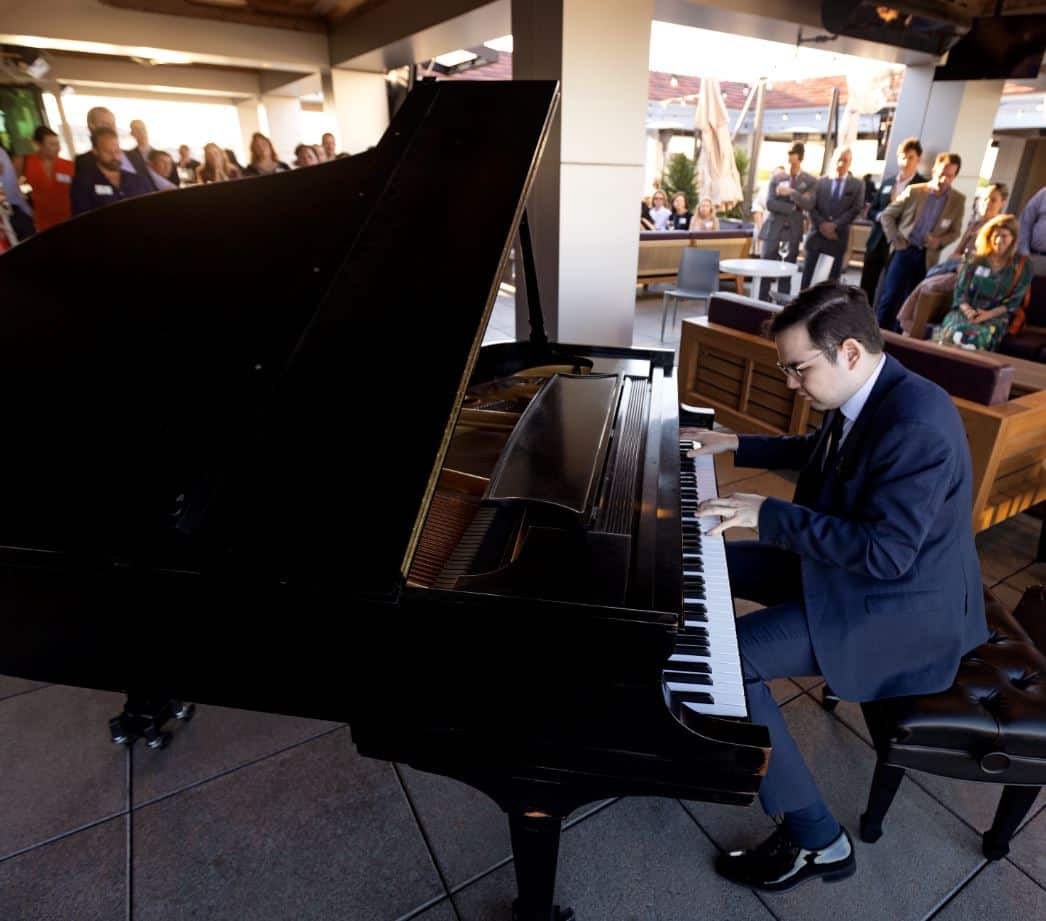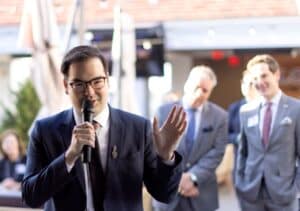
Former Cliburn junior champion leaves mark on international stage
By Tori Couch
Photography by Ron Jenkins
The Third Cliburn International Junior Piano Competition and Festival will be June 8-17 in Dallas. In advance of the competition, 360West sat down with the inaugural 2015 junior competition winner, Alim Beisembayev. Beisembayev started playing piano at age 5 while growing up in Kazakhstan. At 12, he moved to London to study music at The Purcell School. He is now pursuing a postgraduate degree at London’s Royal College of Music. Beisembayev has performed at music venues around the world, won the 2021 Leeds International Piano Competition and released a studio recording of Liszt’s Transcendental Etudes with Warner Classics in 2021. Beisembayev, 25, visited Fort Worth in April for the Cliburn’s concert series and performed at Fort Worth’s Monnig Middle School as part of the Cliburn in the Community outreach program. He also performed at the Kimbell Art Museum and at Lot 12, a hotel rooftop bar at TCU.
We spoke with him about his Cliburn win and his flourishing career. Our conversation is edited for brevity.

360West: Watching you perform at the middle school, it looked effortless. After 20 years, does playing the piano almost become second nature?
Beisembayev: After 20 years of doing something like that every day, almost every day, the instrument becomes a part of you. It’s also a language of sorts. People adapt the language to themselves and express themselves in a certain way.
360West: Why did you audition for the 2015 Cliburn International Junior Piano Competition?
Beisembayev: I had done competitions when I was about 10 years old. I had won competitions. At the age of 16 and 17, I sort of came back into it. We heard the Cliburn was launching the first junior competition. It was sort of like a dream, because serious pianists know about the Cliburn competition around the world. It’s one of the top ones. The fact that they were launching this junior competition I thought was perfect. I was 17, so I was at the top of the age category. It would have been my last chance to enter, so I thought I would really like to, and it was an excuse to visit the States as well.
360West: What do you remember about that competition?
Beisembayev: It was very special. I remember arriving in Fort Worth and being met by my lovely host family and being taken to the dorms where we all stayed together. Slowly meeting all these other young pianists. That was quite something. Then when you start practicing, you start hearing the others practice. You think, ‘How on earth am I going to beat that?’ Everybody is topnotch, very well-prepared. Because music unites everybody and is always something in common, we all became very good friends very quickly.
360West: What opportunities did winning the junior competition bring?
Beisembayev: I’ve come back to Fort Worth several times, and the Cliburn has been great. They really prepare you for what’s coming next. This sort of next step into the adult world of musicians. They talk about how to present yourself, making a website and all the professional things like that. There are simple things that we forget to think about, like even professional photos, because we have to do so much. I come back and play concerts around here. Concerts are a very valuable experience as well, because I think performing as much as possible for young people is important. To learn how to deal with nerves as well, because everybody is very nervous.
360West: Do you still get nervous before a performance?
Beisembayev: Yes, I still do. I had to play for five minutes yesterday and I got nervous.
360West: How often do you return to Texas?
Beisembayev: I’ve been back three times in seven years. There’s always something. I always meet the Cliburn team whenever they are in London, just to keep up, and I can come here for advice.
360West: How do you build up your repertoire for competitions and performances?
Beisembayev: As very young artists, it’s very difficult. You learn about yourself pretty much for the rest of your life. The greatest pianists alive who are very old still say they’re still students, because there’s no end to the art and to the music that’s written. That’s why it’s lasted so long. There’s never-ending meaning in the music. Young artists are still learning about themselves and their strengths and weaknesses. I think that’s very important, that people need to know those strengths and weaknesses. Not everybody does. According to those, you choose repertoire for a competition.
360West: How has winning the Leeds International Piano Competition helped your music career?
Beisembayev: Once you win, you get picked up by a management company. I’m now with a London-based management company called Askonas Holt. That is huge to have a manager who helps you and guides you. I hadn’t played as many concerts as I had before I won Leeds. I had my debut at the BBC Proms. I played with the BBC Symphony Orchestra. I played with several conductors I dreamt of playing with, including Sir Antonio Pappano, who’s a very big name in London. I’ve played with the German orchestra on German radio. I had my debut in Paris last December. I had a tour in South Korea, which was a very memorable thing. I go back to play in Kazakhstan as well.
360West: Is there a venue you hope to play at during your career?
Beisembayev: Carnegie Hall is a dream. I would also love to play in Japan. It’s somewhere I’ve always wanted to visit.
360West: What advice would you give young musicians?
Beisembayev: Believe in yourself. I think you’ve got to love what you do or learn to love it. Somehow, you need to absolutely be in love with music. Build up repertoire. That’s very important. You need to learn as much as possible when you’re young. Staying open-minded and learning about everything there possibly is about music. Not only piano music but orchestral music, operatic music and contemporary music. Learning from your past experiences is very important, because a lot of people might be better than others at learning from their mistakes. When you work on something so personal for a long time, sometimes it’s difficult to acknowledge your mistakes.
THE DETAILS
The Cliburn International Junior Piano Competition and Festival will be June 8-17 for pianists ages 13 to 17. The first three rounds are at SMU’s Caruth Auditorium. The top three finalists will perform a concerto with the Dallas Symphony Orchestra at the Meyerson Symphony Center. Ticket information for each round is available at cliburn.org.
